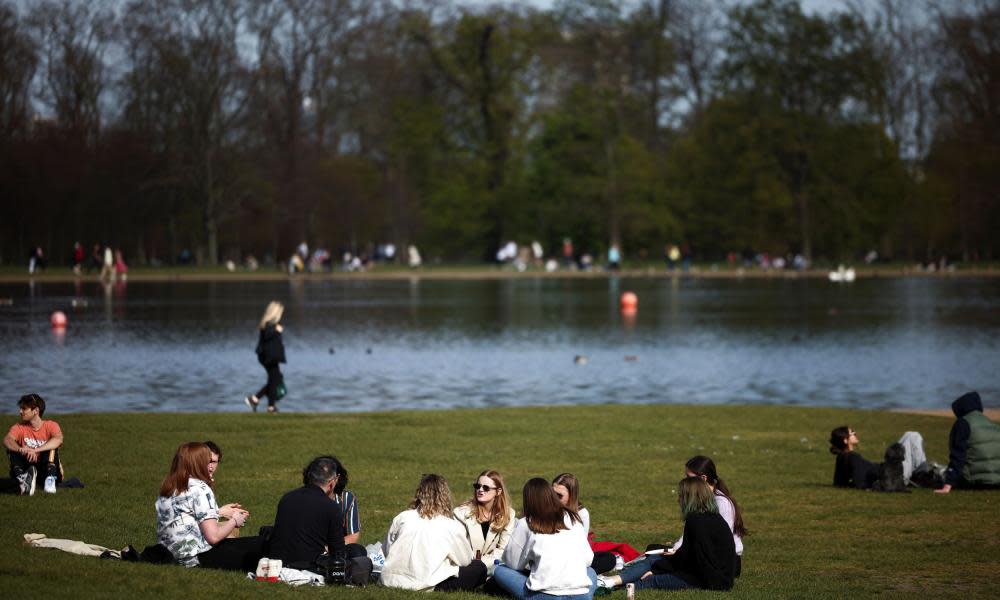‘It’s weird’: anxiety and excitement in England as lockdown eases

Last week non-essential retail and outdoor hospitality venues reopened in England, while people were allowed to visit holiday lets with members of their household.
For many, the reopening led to long-awaited reunions with family or overdue haircuts, but for others the easing of Covid restrictions proved more intimidating. Here, four people share their experiences of emerging from the latest lockdown.
‘It was freezing, but it was so nice to be in a space with somebody’
Charlene Robinson, 47, enjoyed a burst of good luck during last week’s reopening; in October she had booked a holiday on the off-chance they might be allowed. Along with her husband, two children and a puppy who joined the family during lockdown, Robinson travelled from their home in Nottingham to Margate in Kent for a four-day stay last week.
Robinson is originally from Kent, and her brothers still live there, so the families met in turns for the first time in more than six months, enjoying picnics on the beach and outdoor dining at restaurants.
“It was freezing, but it was so nice to be in a space with somebody, rather than on a screen or texting. It felt like coming home,” she says. “It was nice to see the kids well, and they had grown. They had a bit more swagger.”
Robinson, a counsellor who continued to go into work during lockdown, says she did not find the social interactions too overwhelming. “I had seen more of my colleagues and clients than family, which made the transition to being around people a little bit easier.”
Her family are close, and usually see each other at school holidays, so she was left “heartbroken” when plans for Christmas reunions fell through after the government’s U-turn. “You take family for granted,” she says. “It wasn’t until I saw them that I thought: ‘This is what it’s all about.’”
‘This week has proved how necessary social interactions are’
“At first I thought that coming back to life would be difficult,” says Francisco Martin, 22, a PhD student at Queen Mary University of London. “I no longer enjoy being too close to people, and it unconsciously comes with some anxiety. However, as if nothing had happened in the last 13 months, I slowly made use of the restrictions being lifted.”
On Tuesday, he enjoyed drinks in the park with colleagues at the university for the first time since he joined six months ago, and later with friends in Shoreditch.
“We tried to find a table at a local pub around Victoria Park, but even though we were promised it was going back to normal, there’s no normal in places being fully booked for weeks,” he says. However, this did not put him off.
“It didn’t matter how cold it was, or how ridiculously high the prices can be in London for a not-so-fancy drink, I missed worrying about spending the little money I have.” He also popped in for a much-needed trip to the hairdressers.
After months of isolation due to coronavirus restrictions, Martin described the easing as “feeling amazing”.
“With very little social activity, and the uncertainty around the future, my mental health took a very hard hit,” he says. “This week has proved how necessary social interactions are … things I didn’t even value in the past like getting a haircut or having spontaneous plans now feel like a luxury, a treasure to appreciate.”
‘It was really overwhelming, being really stressed and having to rush through huge throngs of people’
Not everyone found the adjustment so easy. In Birmingham, Kate Katafiasz, university lecturer, ventured out on Saturday to help her students with a play they are putting on.
“It’s weird because you’re having to take your body to places, as opposed to just digitally connecting with things. I hadn’t realised until I started to come out of lockdown how digitised my life had become,” she says.
While Katafiasz says having conversation with others in person was “lovely”, she was thrown off by the traffic and large number of people on the streets as hospitality venues reopened.
“I had thought it would take 15 minutes to get there, but it took much longer. The area was heaving with people going out for a drink. It was really overwhelming, being really stressed and having to rush through huge throngs of people,” she says. “Now being out and about is accompanied by paranoia over whether people are distancing.”
However, the reopening was smoother for her dog, Django, which went on a walk with other dogs this week. “In lockdown we haven’t been able to do the pack walks,” she says. “So the dog also experienced coming out of lockdown. It allowed him to socialise too.”
‘I can’t see myself going to a pub or a restaurant’
In London, 34-year-old Simone Bengochea has also struggled with coming out of lockdown. “I felt extremely anxious. I went for a walk with my baby and husband and all the restaurants and pubs had full outdoor terraces. I panicked. I just turned the buggy around and went home, and stayed in for the entire weekend.”
“Usually I take 11-month-old Alba on a daily walk to the park, which is about five minutes along a street, which has a pub, a pizzeria and a few shops. I’m used to it being quiet,” says Bengochea. “Suddenly, there was a long queue outside Sainsbury’s, and I’m trying to dodge everyone and keep a 2-metre distance. The sidewalks are full of chairs and tables.”
Bengochea is opting to visit the park only during quieter hours, such as late morning. However, she says she is not planning to immediately take advantage of outdoor hospitality reopening.
“I can’t see myself going to a pub or a restaurant,” she says. “My friends and workmates are like: ‘Let’s go have a drink,’ but I just think: ‘You’re crazy. I haven’t had the vaccine!’”

 Yahoo Movies
Yahoo Movies 
